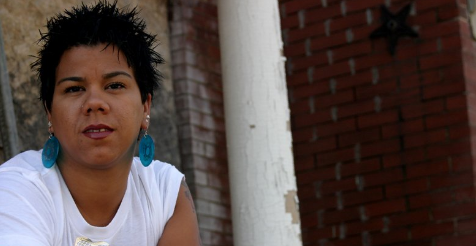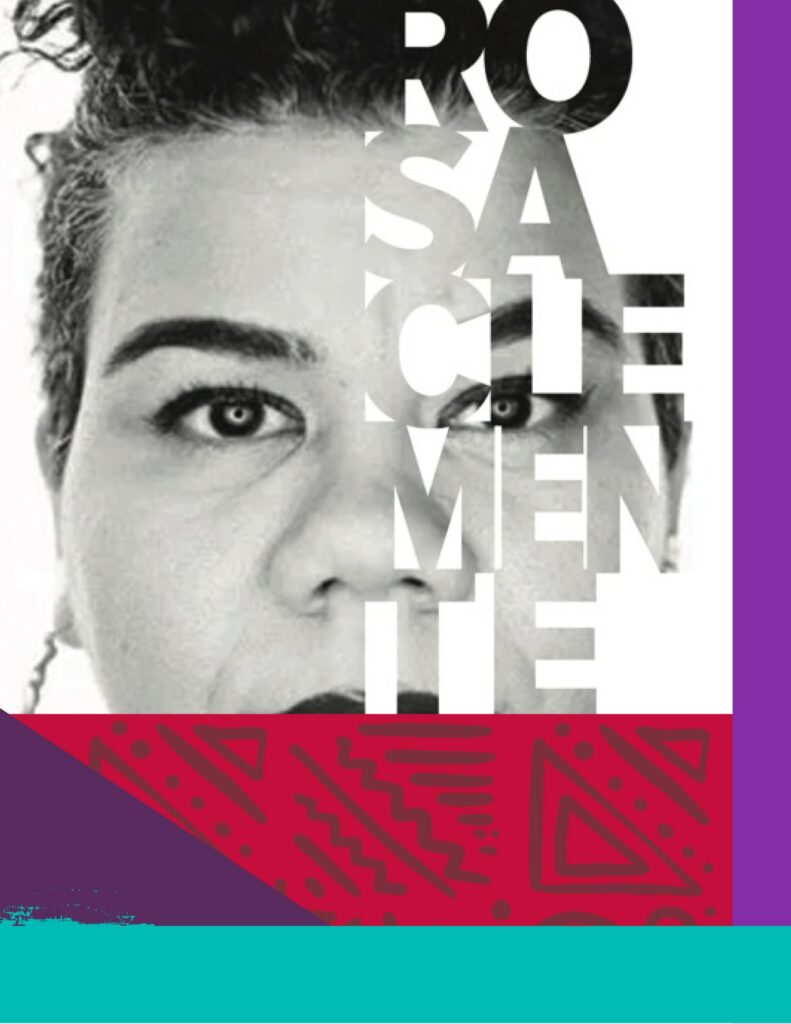An Interview by Tanisha C. Ford for The Feminist Wire.
Rosa Clemente is an Afro-Puerto Rican grassroots community organizer, Hip-Hop activist, independent journalist, and scholar. She is a feminist we love because she boldly continues in the radical activist tradition of Assata Shakur. The Bronx native is a prominent voice of the Hip Hop generation. She has organized around the freedom of political prisoners, against police brutality and founded a full-service speakers bureau, Know Thy Self Productions. During the 2008 Presidential election, Clemente was the Green Party’s Vice Presidential nominee and running mate of former Democratic Congresswoman Cynthia McKinney. Through her candidacy, she brought national attention to issues such as ending mass incarceration, amnesty for undocumented people and the immediate release of United States political prisoners.
Clemente has traveled internationally, delivering countless lectures at high schools, universities, and prisons. She has also appeared on HuffPost Live, CNN, NPR, and C-Span, speaking on issues ranging from freeing political prisoners to the dangers of what she terms “the rap industrial complex.” Recently, Clemente took to social media to speak out against Rick Ross’s rape lyric and the consequences of rape culture in the U.S. She posted a call to action video on YouTube, which instantly went viral (nearly 20,000 views), and inspired other video campaigns.
We had an opportunity to speak with Rosa. Check out our interview with her below.
TFW: Tell us about your “feminist awakening.”
RC: After I graduated from Cornell in 1998 and moved back to New York and started organizing, I fell into this moment where I and a bunch of others realized Hip Hop could be used politically; it wasn’t just about those four elements. I joined the Malcolm X Grassroots Movement. I started managing the Welfare Poets, and from there, I connected with dead prez. I believed strongly that I had to embrace feminism when I became known as a Hip Hop activist. It wasn’t that I didn’t understand black feminism prior to this moment. I understood Black feminism very well. One of my mentors and professors was Vivian Verdell Gordon who wrote the book Black Women, Feminism, and Black Liberation: Which Way. I met her when I was an undergraduate at SUNY Albany, and she was my mentor until her death. So, it wasn’t that I didn’t know the theory of it. But, I didn’t embrace it until I moved into these spaces that were politically revolutionary. I realized I was clearly being treated unfairly because I was a woman. I started to think about what I was going to do to address these issues.
TFW: In 2008, you were the Vice Presidential nominee on the Green Party ticket. What inspired you to run? What did you feel the country needed at the time?
RC: Cynthia McKinney called and asked me to be her running mate. And, I was like “Okay let’s go.” We got the nomination from the Green Party on July 12th, 2008 in Chicago, and we went full speed ahead. The main reason I ran was because I am a Green Party member. I had also given Obama money the minute he was picked to be the nominee because I thought it was an important part of history. As a Green Party member who hasn’t voted Democratic in 20 years, I had no interest in his platform. In the back of my mind, I hoped that maybe Obama would be different. But, I wanted to be part of a party that stands for social justice, that’s about supporting Puerto Rico being free, that’s about Palestine being free, that’s about the freedom of political prisoners.
If people actually read the Green Party platform, then they would have to be very conscious in still choosing to vote for a Democrat. And I realized that people don’t want to read that platform because it would shatter a lot of what they believe to be true, especially as activists. There’s no way if you’re conscious that you could read the Green Party platform — in my opinion — and still vote Democratic. Cynthia McKinney has always been a hero to me, especially when she had the hearing on political prisoners and the hearing on the FBI files on Tupac. The fact that she chose to join the Green Party and not run on the Democratic Party made me think, “Yo, Cynthia is on some things that most of us don’t know, and I roll with her, and I trust her.” And, that’s how it went down. We went full speed ahead.
And lastly, there’s no other party that a Vice Presidential candidate can say, “I’m from the Hip Hop generation and I am representing every Hip Hop policy that everybody has always wanted represented” and have it fully embraced by an electoral political party. I don’t think a lot of people in Hip Hop understand. All these things that we generally fight for, the minute I came to the table, these issues are now a part of the party platform for good. Like, ending mass incarceration, that comes because of Hip Hop. And, that comes from the fact that I was at the table when we amended the party platform, and Jared Ball was at the table. We pushed for that as well as amnesty for undocumented people. If people would understand that there were actually tangible things that happened that are now in an electoral political platform that were never in any other electoral party’s platform, they might look at the Green Party differently.
TFW: You recently created a YouTube video in response to the Rick Ross rape lyric on “U.O.E.N.O.” that went viral and inspired other people to mobilize around ending rape culture. What were your hopes for the video?
RC: I came home from class, and I saw [the lyrics to the song]. I was in my bedroom with my husband, and I was like: “I’m sick of this shit! I’m not waiting for anybody else. I’m going to put a video up. I’m not going to have a discussion. I’m just going to go with what I feel.” The fact that it got almost 20,000 views is still unreal. That’s insane. I just did it, and I was real, and I think that’s why it resonated. I know I have a good sense of what’s really going to touch a nerve with people. The Steubenville shit had just gone down, last year we dealt with Too $hort, because we see everyday in the media that there was a sexual assault or that someone has tried to cover up a sexual assault and that the numbers are increasing. It was a great opportunity to seize the time. It hit a nerve, and I know that my message received the response it did because I put out the message to men.
For a long time now, every time I speak, I am sure to put out the message that sexism is not only a women’s issue. I was sick of always having to be the one to talk about gender. What about you men? This is a constant conversation I’ve been having in hip hop with all the men. It was because of hip hop that I embraced feminism because I got sick and tired of the way I was being treated by men. And, I was sick of the ways that I saw other women be treated. So, for me, I felt like it was time for the brothas to step up. My husband, Justice, said, “Yo, men gotta step up. This is not just about the women speaking out. This is about our daughters. We’ve got to say something and do something.”
It’s interesting that you say I inspired people because there are some people who have been purposefully trying to write me out of that story, including some women. But, I think my video spoke to the people. My ultimate goal was to get men to stand up, to reach young people, to make it accessible to as many people as possible, and to push back on brothas who are part of the industry and Hip Hop activism and still engage in sexist and misogynistic behavior.
WATCH: Rosa speaks on Rick Ross and hip hop lyrics on HuffPost Live.
TFW: This month, TFW is running a forum in honor of activist Assata Shakur. I know you’ve spoken publicly on the U.S. government adding her to the FBI’s Most Wanted Terrorists list. What does Assata mean to you personally, and how does she inform your activism?
RC: First and foremost, what Assata has consistently taught me is that I don’t have to ask for permission for anything I do. When it comes to loving my people, I don’t have to ever ask for permission to do what I think is the right thing. When I was an undergrad and became an Africana Studies major, her autobiography was the first book Dr. Gordon gave me. I had never heard of Assata Shakur before, and Dr. Gordon said “Now that you’re in Africana, you need to know who Assata is.” And, I read her autobiography, and it changed my life. I was becoming politicized to what it meant to truly be a freedom fighter. It got me to read about COINTELPRO. Her story opened the door to everything. To me, she and Lolita Lebrón have always been the two sheroes in my life. If I can be one tenth like them, I’m good.
Assata is completely uncompromising, not afraid. She has had to give up her life, her family, for freedom and what she believes freedom is. There’s a reason there’s a bounty, and there’s a reason why every other year they do this. They want us to never forget that they’re trying to capture her, dead or alive. They want us to know they’re willing do to do anything to capture her dead or alive. And, I think when the government put so much weight on capturing a sixty-plus year old woman, they’re sending a signal that not only should you never aspire to be like Assata, you shouldn’t even really know who she is. All you need to know is that she’s a terrorist. But, there are a lot of us who are not going to forget Assata, who are teaching on Assata, and they don’t want that historical memory to be maintained.
So, to me, she is everything. People actually think that President Obama doesn’t know this is happening. Of course he knows. He knows every terrorist because they have a list of them, and now Assata is one of them that they want dead or alive. This action came under a black attorney general and a black president and that’s an even more sinister message. All we can do is make sure that they will never capture her.
WATCH: Rosa speaks on Assata Shakur being added to the FBI’s Most Wanted list on HuffPost Live.

